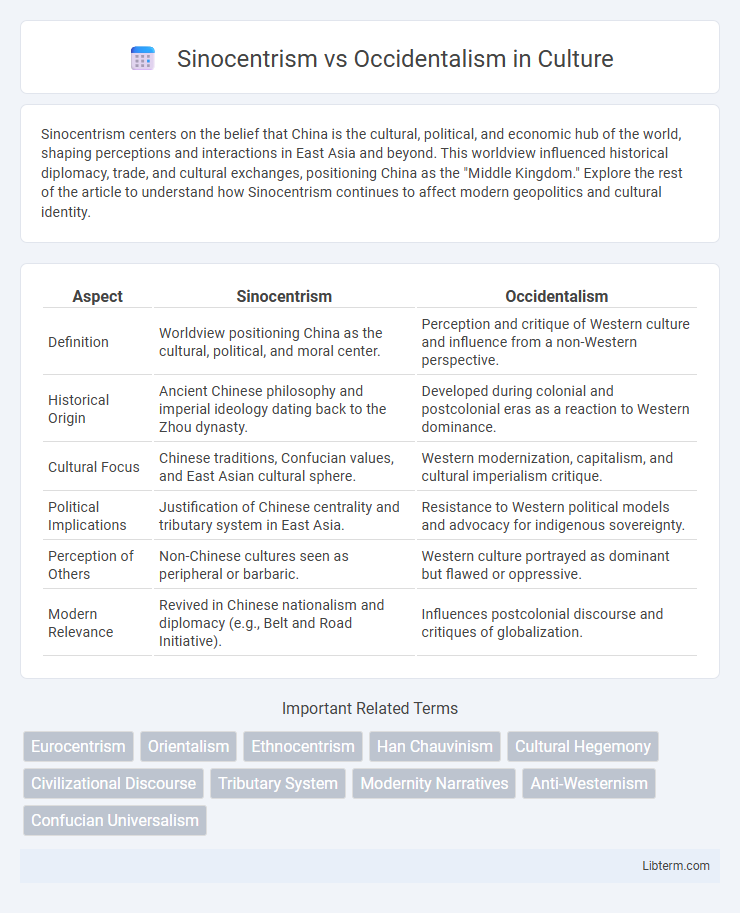Sinocentrism centers on the belief that China is the cultural, political, and economic hub of the world, shaping perceptions and interactions in East Asia and beyond. This worldview influenced historical diplomacy, trade, and cultural exchanges, positioning China as the "Middle Kingdom." Explore the rest of the article to understand how Sinocentrism continues to affect modern geopolitics and cultural identity.
Table of Comparison
| Aspect | Sinocentrism | Occidentalism |
|---|---|---|
| Definition | Worldview positioning China as the cultural, political, and moral center. | Perception and critique of Western culture and influence from a non-Western perspective. |
| Historical Origin | Ancient Chinese philosophy and imperial ideology dating back to the Zhou dynasty. | Developed during colonial and postcolonial eras as a reaction to Western dominance. |
| Cultural Focus | Chinese traditions, Confucian values, and East Asian cultural sphere. | Western modernization, capitalism, and cultural imperialism critique. |
| Political Implications | Justification of Chinese centrality and tributary system in East Asia. | Resistance to Western political models and advocacy for indigenous sovereignty. |
| Perception of Others | Non-Chinese cultures seen as peripheral or barbaric. | Western culture portrayed as dominant but flawed or oppressive. |
| Modern Relevance | Revived in Chinese nationalism and diplomacy (e.g., Belt and Road Initiative). | Influences postcolonial discourse and critiques of globalization. |
Defining Sinocentrism and Occidentalism
Sinocentrism refers to the historical and cultural worldview that positions China as the central and most significant civilization, often perceiving other societies as peripheral or less developed. Occidentalism, conversely, represents critical or stereotypical perceptions of Western societies, often emphasizing perceived cultural, political, or moral shortcomings in contrast to non-Western values. Both concepts reflect competing narratives shaping identity, geopolitics, and intercultural relations between China and the West.
Historical Origins and Evolution
Sinocentrism originated from ancient China's belief in its cultural and political supremacy, centered around the Middle Kingdom concept, influencing East Asian diplomatic and trade systems through tributary states. Occidentalism emerged as a counter-response during the 19th and 20th centuries when non-Western societies, including China, reacted to Western colonialism and cultural dominance, often framing the West as morally or culturally inferior. Both ideologies evolved through historical interactions, shaping national identities and international relations by emphasizing distinct worldviews and power dynamics.
Core Philosophical Differences
Sinocentrism centers on the belief in Chinese cultural and political supremacy rooted in Confucian values emphasizing harmony, hierarchy, and moral governance. Occidentalism critiques Western modernity by highlighting perceived materialism, individualism, and cultural arrogance, often contrasting these with Eastern collectivism and ethical frameworks. The core philosophical divide lies in Sinocentrism's focus on societal order and ethical duty versus Occidentalism's emphasis on rationalism and individual rights.
Sinocentrism in Ancient and Modern Contexts
Sinocentrism, rooted in the ancient Chinese worldview, positioned China as the cultural and political center of East Asia, with neighboring states considered tributary or peripheral. In the modern context, Sinocentrism adapts to global dynamics through China's emphasis on its historical legacy, cultural pride, and growing geopolitical influence, challenging Western dominance. This continuity reflects a blend of traditional Sino-centric identity and contemporary nationalism shaping China's foreign policy and intercultural perceptions.
Occidentalism: Roots and Manifestations
Occidentalism originates as a reaction to Western colonialism and globalization, emphasizing opposition to Western cultural, political, and economic dominance. It manifests through critical narratives in literature, political discourse, and social movements that portray the West as a source of moral decay, imperialism, and cultural arrogance. This ideological framework often serves to reinforce national identity and justify resistance against Western influence in regions such as Asia, the Middle East, and Latin America.
Cultural Narratives and Power Dynamics
Sinocentrism centers Chinese cultural narratives around the historical concept of China as the Middle Kingdom, emphasizing Confucian values and hierarchical order to legitimize political authority and cultural superiority. Occidentalism counters this by framing Western cultures as imperialistic and morally decadent, often constructing an 'us versus them' discourse that challenges Western hegemonic power and justifies resistance or alternative development models. These opposing narratives shape global power dynamics by reinforcing identity politics and influencing diplomatic strategies between China and Western nations.
Impact on International Relations
Sinocentrism, with its emphasis on China's cultural and political centrality, shapes diplomatic strategies by promoting regional influence and reinforcing hierarchical international norms. Occidentalism, as a critical response to Western dominance, fuels ideologies that challenge Western policies and advocate for alternative global governance models. These contrasting worldviews impact international relations by creating ideological divides that influence alliance formations, trade negotiations, and conflict resolutions.
Influence on Education and Scholarship
Sinocentrism shaped East Asian education by emphasizing Confucian classics, fostering centralized curriculum models and civil service examinations that prioritized moral philosophy and social harmony. Occidentalism influenced educational reforms in China and other Asian regions by introducing Western science, technology, and secular knowledge, challenging traditional Sinocentric paradigms and encouraging modernization. These competing ideologies resulted in hybrid scholarship systems that combined Confucian ethics with Western methodologies, significantly impacting curriculum development and academic discourse.
Contemporary Debates and Controversies
Contemporary debates on Sinocentrism versus Occidentalism center on the evolving geopolitical influence of China and the West, highlighting China's rising assertiveness in global affairs contrasted with Western perceptions of cultural and political superiority. Scholars analyze how Sinocentrism manifests in China's foreign policy and national identity, while Occidentalism critiques Western hegemony and cultural imperialism. These controversies illuminate deep-seated ideological conflicts shaping international relations and cultural exchange in the 21st century.
Towards Reconciliation and Mutual Understanding
Sinocentrism, emphasizing China as the cultural and political center, contrasts with Occidentalism, which critiques Western dominance and values. Efforts towards reconciliation and mutual understanding involve recognizing historical biases and fostering dialogue that respects both Chinese and Western perspectives. Promoting cross-cultural exchanges and collaborative scholarship helps bridge ideological divides and builds a foundation for global harmony.
Sinocentrism Infographic

 libterm.com
libterm.com